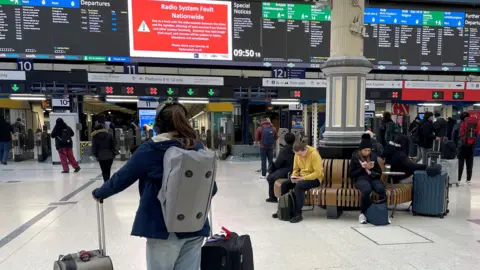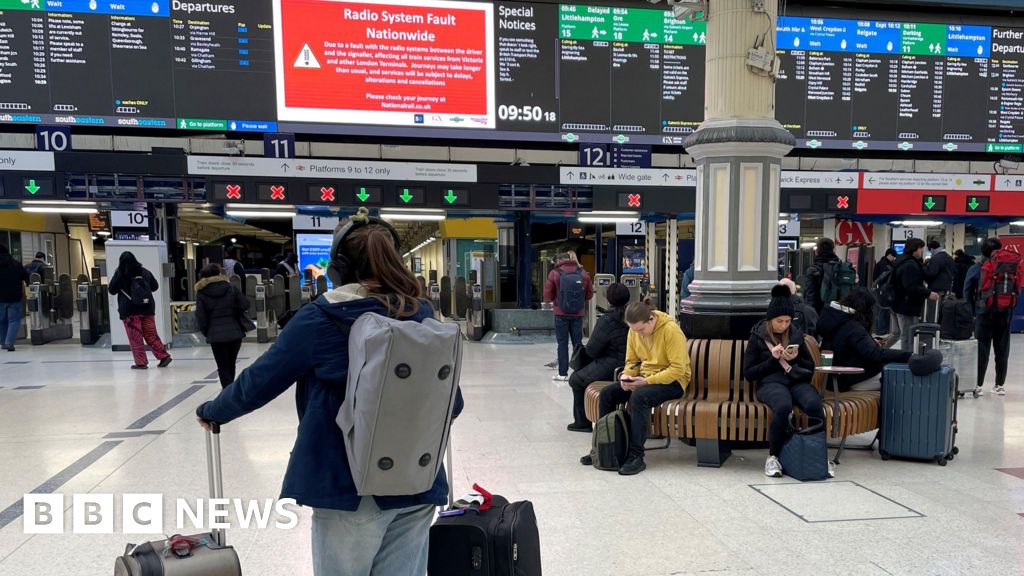 PA Media
PA MediaA “nationwide fault” has caused major disruption across at least 10 lines of the UK’s rail network, National Rail says.
National Rail blamed the issue on the radio system used between train drivers and signallers.
The issue has now been fixed, but residual delays may continue while the timetable is restored.
Services in and out of England’s major transport hubs, including Manchester Piccadilly, London Paddington and Southampton Central, were affected.
Great Northern, Northern, ScotRail, Southeastern, Southern, South Western Railway, Thameslink, Gatwick Express, Heathrow Express and the Elizabeth line were all impacted.
Travel expert Simon Calder told BBC Radio 5Live that Friday morning had been “a miserable rush hour for a lot of people”.
National Rail said the issue appears to be a fault with the onboard GSMR radio system, which is used to communicate in case of emergencies.
The BBC understands the cause of the fault has been located and has been fixed.
To ease disruption prior to this, a back-up system was being used instead.
Network Rail said the issue was mainly affecting trains at the start or end of the day, which a spokesperson said was “causing a few minutes of delay at the start of the day”.
But “once up-and-running the system is working normally and the impact on passengers is minimal,” it added.
Even though the problem has now been fixed, National Rail said there may be some residual disruption while timetables are restored.
It advises that passengers may be entitled to compensation if their journey is delayed.
‘Third consecutive day’ of delays
 Matthew Smith
Matthew SmithOne passenger told the BBC he ended up paying for a £54 taxi ride to finish his journey.
Matthew Smith, 47, was travelling from Portsmouth to Basingstoke on Friday morning for work. The train he intended on getting was no longer stopping at Basingstoke so he was advised to catch the next one, half an hour later.
“Staff at the station had as much information as I could obtain from the app,” he said.
Mr Smith eventually caught a train to Havant before deciding to finish his journey in a taxi.
“This is the third consecutive day where there have been issues on these trains and it is not pleasurable or acceptable especially given the price we pay for rail journeys,” he said.
At London Waterloo, some commuters said they would be at least an hour late to work because of the disruption. One woman said she was running three hours late for a job interview.
BBC producer Carolyn Rice was on board a train from Southampton bound for Waterloo, but it ended up terminating at Woking an hour behind schedule.
That was on top of disruption caused by over-running engineering works.
Across the network on Friday morning, most delays appeared to be no longer than 15 minutes, but some services were delayed by up to an hour.
Earlier in the day, National Rail said travellers should plan for some services to be cancelled at short notice.
ScotRail said its services were affected on Friday morning but have since returned to normal operation.
The Gatwick Express was only running between London Victoria and Gatwick Airport, and some Heathrow Express trains were delayed.
Services along the entire Elizabeth line were also affected.
Elsewhere, journeys between Brighton and Southampton Central, and Kings Lynn and London Kings Cross, were not running the entire length of the line.
What’s causing the disruption?
The issue was caused by the railway’s GSMR system, which allows drivers and signallers to communicate in areas – such as tunnels – where previous analogue systems did not work.
It works in a similar way to mobile phones, but the digital system is not reliant on commercial mobile phone operators. The rail network has its own contained phone and mast system.
One rail source told the BBC that “the system [wasn’t] connecting easily”.
The BBC understands that a new piece of hardware, installed as part of an upgrade to the system at a major telecommunications hub in Stoke, was the source of the problem.
Replacement hardware has been installed and the system rebooted.
While that was being fixed, we were been told that there were no safety-critical issues, as staff were using a workaround to manually reconnect.
This well-rehearsed backup is where drivers enter a code provided to them on a “wild card”, which lets them establish communications with the national network.
It has been described to us as working like a wi-fi password – when the correct code is entered, the system becomes fully operational and will remain so.
Radios that had been manually programmed by drivers are now being switched back to automatic mode.


